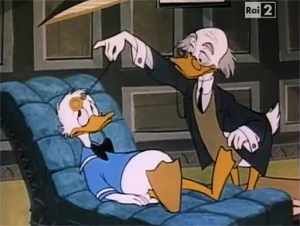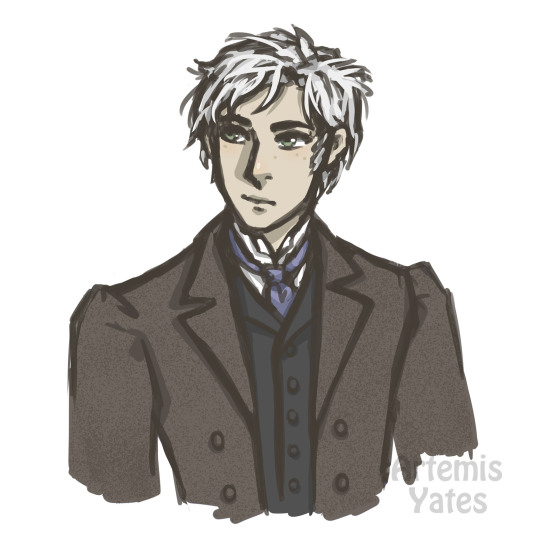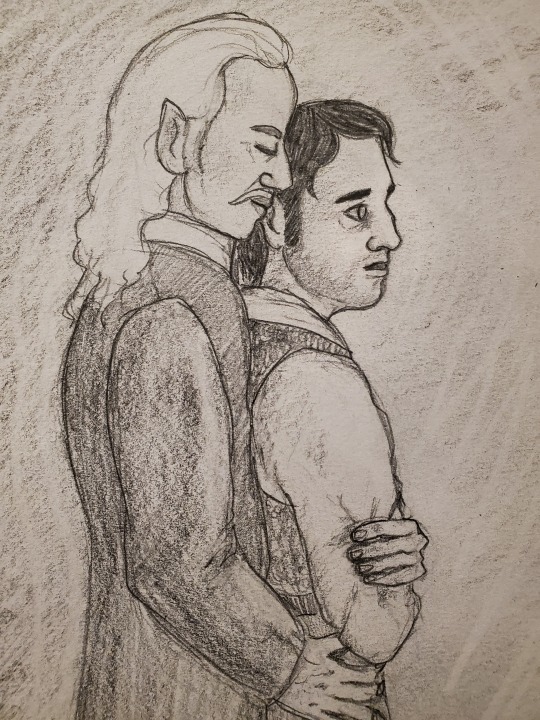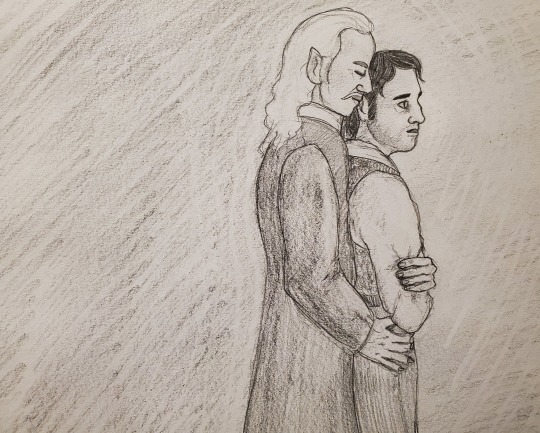#implied dracula spoilers
Text
Now I don't personally believe that Dracula was for real terrified of Mina, however, he did flee after seeing this dainty girl (who saw him in the graveyard with his red eyes and immense figure) not faint or scream or freeze or flee despite her obvious fear but run straight at him.
Dracula is at his worst when something he wasn't anticipating happens. He wasn't expecting Jonathan to pick himself up and literally crawl up the castle walls and dare try to kill him. If he was expecting that, he'd not be having a scar now. He wasn't expecting the Captain of the Demeter to defy him by tying himself up on the wheel with a crucifix. If he did, the logs would have been gone now.
Mina woke up and ran into the night defying every fear, convention, risk, to save Lucy from man or beast. That wasn't on his Bingo card. He was forced to stop hurting Lucy and fled.
Then Mina wakes up again, sensing something wrong, and goes to the window and spots him. He flies closer a couple of times but she remains there. He's forced to flee again. Mina believes she scared the 'bat'.
To me, these two scenes establish a few things.
-Bravery as a core trait for Mina.
-Mina as the one who hunts Dracula down.
Jonathan wounded him in his box, the Captain denied him apotheosis, but Mina made him run.
#dracula daily#mina murray#count dracula#jonathan harker#the captain of the demeter#implied dracula spoilers
1K notes
·
View notes
Text
Given my research that a single wax cylinder could only record two minutes' worth of audio and each one cost 50 cents in the 1890s, which would be equivalent to almost $20 USD today, someone should tally up the final run-time of Seward's phonograph diary entries and calculate how much he blew on wax cylinders just for whatever was included in the compiled documents.
3K notes
·
View notes
Text
The captain steers his ship. Alone in the fog he commends himself to the hand of God. He knows he is not safe, one man cannot run a ship alone. But still, he thinks the killing has stopped. The first mate, mad, jumped overboard raving. The captain sets up a lonely vigil in the fog. Hoping to one day signal for help before he drifts too far. Hoping he will one day see home again. Hoping that with the loss of the madman, the worst is over.
But this is Dracula, and the madman is not the enemy, he is the warning.
563 notes
·
View notes
Text
Van Helsing expectations


Van Helsing reality


#i mean he also [redacted] and he hate hate hates it the entire time and cries#abraham van helsing#dracula daily#implied dracula spoilers#blood
305 notes
·
View notes
Text

(Quick little sketch of Jonathan Harker as I try to settle on a design for him.)
#It's the lawyer man!#I love this dork so much#jonathan harker#dracula#dracula art#daily dracula#dracula daily#re: dracula#dracula daily art#dracula daily 2023#implied dracula spoilers#maybe???#gothic literature#gothic lit#gothic lit art#gothic fiction#classic literature#classic lit#classic lit art#sketch#book characters#character art#art#my art
369 notes
·
View notes
Note
Bram Stoker: Here's a good guy, a more morally grey guy, and a very bad guy. They're all old, tall, commanding, and very strong. I don't have a type.
Bram Stoker Old Man Enjoyer
Also! Like, these three specific characters occupy such iconic parts of the book, it feels very intentional. There is a buff old guy to suit most people's tastes!
#dracula (novel)#dracula daily#r.m. renfield#bram stoker#implied dracula spoilers#abraham van helsing#thebibi answers#renfield
173 notes
·
View notes
Text
Jonathan taking refuge in the women's wing, feeling comfort and kinship with its previous inhabitants is soooo good.
The fondness and little laugh in Ben Galpin's voice, as he imagines the lady penning a letter to her lover, takes what could have been a very bitter line and instead, turns it into one of companionship.
This makes what happens later, with the ladies, all the more awful.
302 notes
·
View notes
Text
7th of May:
The curtains and upholstery of the chairs and sofas and the hangings of my bed are of the costliest and most beautiful fabrics, and must have been of fabulous value when they were made, for they are centuries old, though in excellent order. I saw something like them in Hampton Court, but there they were worn and frayed and moth-eaten.
15th of May:
One or two small rooms near the hall were open, but there was nothing to see in them except old furniture, dusty with age and moth-eaten.
Why does one part of Dracula's castle have remarkably preserved ancient fabrics, and in another part they're damaged and moth-eaten? Some theories:
Bram Stoker wasn't really paying attention to the inconsistency. (The boring answer).
Jonathan Harker doesn't know much about fabric, as a middle-class Victorian man, so his descriptions aren't always accurate.
Dracula has carefully prepared the guest rooms but not the parts of the castle that he didn't plan on Jonathan visiting.
Dracula turns into a bat and eats all the moths in his wing of the castle, but [redacted] are either unable to turn into bats or dislike the taste of moths.
In the Great Mouse Detective version of Dracula that happens simultaneously, Dracula is a bat and eats moths. However, he is also very small, so he doesn't get as far as the other wing of the castle.
Dracula controls all the moths in his castle and steers them away from the guest suite, but he actually kind of likes the spooky moth-eaten look sometimes.
The moths are xenophobic and don't like to be in the parts of the castle where there's an Englishman.
Dracula is a keen chemical engineer and the bed hangings in Jonathan's room are undamaged because they are in fact very early synthetic fabrics that Dracula developed while bored some time in the 16th century.
The guest rooms are under some kind of Sleeping Beauty enchantment; the rest of the castle is not. Given everything else going on, Jonathan doesn't notice the enchantment, though it does affect his sleep patterns from the moment he arrives.
Fabric in Dracula's castle operates under storytelling rules, like the toons in Who Framed Roger Rabbit, where it becomes more or less damaged depending on what's spookier in any given moment.
[Update! Courtesy of @animate-mush you can now vote on your preferred interpretation here]
225 notes
·
View notes
Text
Remember the only other time (before Dracula's departure from Whitby) when Lucy was "free" to talk about Dracula?
Aug 14. The setting sun, low down in the sky, was just dropping behind Kettleness; the red light was thrown over on the East Cliff and the old abbey, and seemed to bathe everything in a beautiful rosy glow. We were silent for a while, and suddenly Lucy murmured as if to herself:— “His red eyes again! They are just the same.”
It was during sunset. Sunset is a liminal time, like sunrise and noon. It's said that during those times, a vampire's power is at its weakest.
This will be relevant again.
109 notes
·
View notes
Note
I don’t know if you’re still taking art requests but can you do one where Jonathan is possessed by Dracula?
Jonathan is having yet another Very Bad Day.


[ID in Alt]
(I'm still taking art requests— feel free to drop an ask or comment with suggestions!)
#my art#dracula daily#implied dracula spoilers#dracula fanart#dracula#count dracula#jonathan harker#dracula (novel)
24 notes
·
View notes
Text
Last night was very threatening, and the fishermen say that we are in for a storm. I must try to watch it and learn the weather signs.
For all the times Mina says she's been learning new things to be useful (journaling, shorthand, train timetables, typing, law, history) it's apparent she does it because she loves learning it might even bring her comfort. She has no justification for learning weather signs, she actually just wants to.
#mina has her own brand of repression#and it's multifaceted#and will have to face it#dracula daily#dracula#implied dracula spoilers
261 notes
·
View notes
Text
I'm happy to see all the meta this year, re: the parallels between Jonathan and Dracula at the castle versus Renfield and Seward at the asylum bc last year, it wasn't really a popular topic of analysis from what I remember, and without spoiling anything, I do think doing a read-through of Dracula last year put Renfield in a different light on a re-read, and it's honestly a relief to see Renfield being treated with more respect and sympathy this time around, as opposed to him being a joke character, prop for Seward's storyline, or his mental illness being stigmatized as something that makes him evil, creepy, and undeserving of sympathy and compassion.
Likewise, as someone who does like Seward as a complex and very flawed character, I'm glad to see more discussion about the way he and Dracula are foils to each other instead of such posts being dismissed as character slander - a lot of characters in the novel parallel Dracula in unique ways, so it's a legitimate topic of analysis if approached in good faith! - as well as viewing his treatment of Renfield in a more critical light bc while he isn't actively malicious in terms of intent, it was a little frustrating last year to see some of that critique reduced to how it's unfair to hold him to modern standards when his actions still nevertheless caused harm and some Victorian contemporaries would have seen them as wrong, not to mention that many of our 'modern' standards regarding mental illness are not progressive at all.
#dracula#dracula daily#implied dracula spoilers#i had been planning to do analysis between the two narratives this year#but there's been so much good analysis already that i have nothing to add#rm renfield#renfield#jack seward#john seward
608 notes
·
View notes
Text
Godverdomme here's the poll I ought to have run
78 notes
·
View notes
Text
I know Lucy compared herself to Ophelia and that this is worrying, given the fact that Ophelia drowned and Lucy has been having drowning dreams but...
Jonathan has compared himself to Hamlet and Renfield was indirectly compared to Hamlet by Jack.
Sure, both Jonathan and Renfield are now madmen, as Hamlet was perceived. But they're not dead!
And Jack quoted Polonius, but he hasn't been stabbed!
#dracula daily#re: dracula#jonathan harker#lucy westenra#hamlet#rm renfield#jack seward#implied dracula spoilers
179 notes
·
View notes
Text
If at the asylum Mina "did not grow up with money" Murray saw Jack's candles wax cylinder budget she'd pull a Jonathan (faint)
#in Lucy's scenario where Mina and he are married#Mina'd be all#gentle persuasion (Force Him to agree) to be very selective with cylinder usage#dracula daily#mina murray#jack seward#implied dracula spoilers
129 notes
·
View notes
Text
Forgive me for harping on about a small inconsequential part of the book, but, the way Jack cannot fully shun and even compliments Van Helsing for going insane and having "monstrous ideas" is a motif that builds on itself for Future Events in the novel. Its part of a larger theme about not just what you would do to avoid the pits of hell but about unconditional love as well. Jack thinks he knows what might happen if Van Helsing has truly gone insane but he decides to follow and look after him anyway (for now. Its a half formed thought). Jack is fascinated but utterly judgemental towards Renfield and completely abuses his power over him, but he cannot feel the same way about Van Helsing.
It's an interesting call back to what Jack thinks in front of Lucy's evergreen corpse: Is all love subjective, or is it all objective? Can you still love the Lucy that preys and bites small children? Or is the love you have for her dependent on when she was alive? Can love even be defined by its acceptability in society? Later in the story this motif of loving someone despite their ruination will come up again, and even the dispatching of vampire!Lucy is hotly debated for its conclusion. What is the shape of unconditional love in a story where vampirism and madness changes you permanently?
#dracula daily#lucy westenra#jack seward#dracula (novel)#implied dracula spoilers#abraham van helsing#y'all dracula dailies better know what im referring to later#the author is dead to me for this post specifically#thebibi on vampirez#helward
102 notes
·
View notes